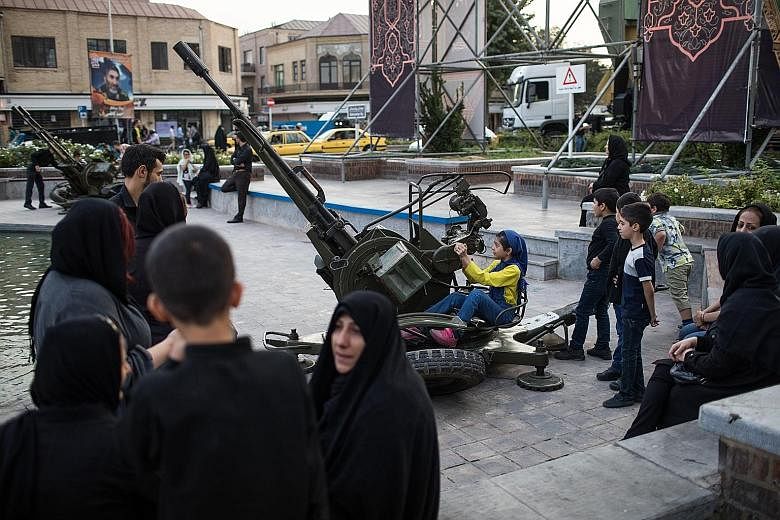TEHERAN • After years of cynicism, sneering or simply tuning out all things political, Iran's urban middle classes are today swept up in a wave of nationalist fervour.
The changing attitude, while some years in the making, can be attributed to two related factors: the election of US President Donald Trump and the growing competition with Saudi Arabia, Iran's sectarian rival, for regional dominance.
Iranians listened during the 2016 campaign as Mr Trump denounced the Iran nuclear treaty as "the worst deal ever negotiated" and promised to tear it up.
They watched in horror when, as President, he sold more than US$100 billion (S$134.5 billion) worth of weapons to Saudi Arabia and participated in a traditional war dance in Riyadh.
And they are alarmed at the foreign policy moves of the young Saudi Crown Prince Mohammed bin Salman, whom they see as hotheaded and inexperienced.
At the same time, they believe they have something to be proud of, with Iranian-led militias playing a central role in defeating the militants from the Islamic State in Iraq and Syria (ISIS), increasing Iran's regional influence in the process.
The two most popular stars in Iran today - a country with thriving film, theatre and music industries - are not actors or singers but two establishment figures: General Qasem Soleimani, the leader of Iran's regional military effort, which is widely seen as a smashing success; and foreign minister Mohammad Javad Zarif, the symbol of a reasonable and measured Iran.
In short, it appears Mr Trump and the Saudis have helped the government achieve what years of repression could never accomplish: widespread public support for the hardline view that the US and Riyadh cannot be trusted and that Iran is now a strong state capable of staring down its enemies.
Iran's hardliners are savouring the reversal in their fortunes, after losing influence in the Obama years.
"Thanks to Trump's dishonest, cheating and crazy remarks, he has proved what we have said for a long time: America cannot be trusted," said hardline political analyst Hamidreza Taraghi. "Many didn't believe us, but now they do."
The seeds of the new nationalism were planted with the election of the moderate Mr Hassan Rouhani as President in 2013. It was the first glimmer of hope for Iran's urban middle classes since the brutal crackdown on street protests following the 2009 presidential election, widely seen as rigged.
Mr Rouhani promised a nuclear deal, to escape the suffocating international sanctions over Iran's nuclear programme that had depressed the economy and isolated the country. When the treaty was signed in 2015, Iranians rejoiced over the chance, finally, to become a "normal" country. Then came the Trump administration, and its singular focus on Iran as the source, as Defence Secretary James Mattis has said on numerous occasions, of all the troubles in the Middle East.
Iran's leaders have begun promoting patriotic causes, recognising in the changing mood a chance to reinforce their credibility.
Recently, missiles were put on display in city centres so that families and children could pose for photos in front of them.
State-run television has been promoting an annual pilgrimage where millions participate in a walk into neighbouring Iraq as a symbol of national and religious strength.
Many Iranians now cheer when a missile is tested, said Professor Hamidreza Jalaeipour, a professor of sociology and a leading reformist, "even those who are completely secular". The tests, he added, "are making them feel strong and safe". The pressure from the United States and the growing threats from Saudi Arabia are creating an us-against-them atmosphere, Prof Jalaeipour said.
The new solidarity in the face of outside threats is not new in Iran, nor is it insulating the government from all criticism.
After the earthquake earlier this month in western Iran, for instance, many people blasted state officials on social media for failing to provide timely help.
Yet, in a demonstration of the newfound spirit, Iranians from across the country pitched in to gather water, food and tents, and transported the aid with their own cars to the disaster zone.
"There is just a big feeling of unity," said office manager Pouria Gorji, who personally delivered four trucks of supplies to the quake area. "We come together when we are hurt."
Borders and geography are other rallying points for nationalists. When Mr Trump gave a speech last month outlining his Iran strategy, he called it a "dictatorship" led by "murderous" leaders who "spread death, destruction and chaos all over the globe".
But what really riled up Iranians was when he called the Persian Gulf the "Arabian Gulf".
Within minutes, Iranian news media began denouncing his use of the name. Two hours later, Mr Rouhani, in a live rebuttal of Mr Trump's speech, wasted no time with the litany of accusations by Mr Trump and cut straight to the point. "How is it that a president has not learnt the name of the international historical gulf?" the Iranian President said. "The same Persian Gulf unfortunately frequented by the American Navy, unduly and constantly. Trump should ask his military who have the maps what is written as the name of this gulf."
In fact, US Navy maps say "Persian Gulf".
NYTIMES

